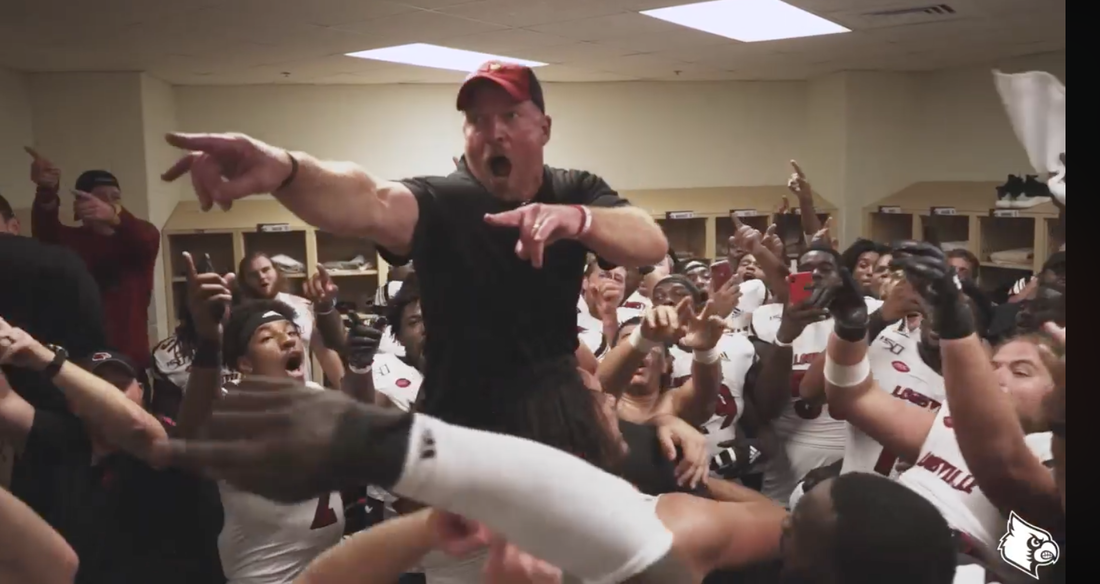
Fair warning, this will be a slightly irrational fan post.
Earlier this month, Louisville football coach Scott Satterfield was named ACC Coach of the Year. It's been one of the feel good stories of the year, and a breath of life for all Louisville fans after the last few years. For those of you wondering, Louisville has looked at football the way the rest of the SEC (except Kentucky) does at basketball. When they're good, cool. When they're not, meh. When they're really bad, the sky is falling. And last year, they were really bad. They finished 2-10, lost their last 9 and should have lost their two wins, and didn't have a pulse after October. Dare I say it, they quit. So two years removed from a Heisman winner and an outside chance at the playoffs, Louisville was rated the worst major conference team in the country, and had to make the difficult and expensive decision to dismiss the coaching staff (all of this on the heels of the basketball program's collapse and its insane financial cost). To top it off, the guy everyone thought would take the job declined. The second choice, from Appalachian State, was announced December 4, 2018.
During spring and summer practices, it was hard to know what was going to happen. There had been an exodus of transfers and the talent pool was already thin to begin with. But then, bit by bit, things got out that said an entirely different culture was being created. Coaches took time to get to the know players, they had pool parties and cookouts at the Satterfield's house, the athletic department as a whole began to support one another (unheard of if you're familiar with Louisville history), and the word "fun" was being used to describe the atmosphere.
The season wasn't perfect. They got blitzed a few times, they gave away a couple wins, and the end was a bitter loss to Kentucky. But they won 7 games, beat a ranked team on the road, and finished second in their division. After watching a listless team last year, it was a breath of fresh air to see that they may have been outmatched talent wise, they weren't going to lose because they quit trying.

The video above is a perfect picture of what culture can do. I took some screen shots to highlight.
Bad culture leads to bad body language leads to bad habits which leads to a vicious cycle. Look at their faces. This is from the introductory meeting. They don't care. They just had a terrible season and now they're getting coach talk from another guy in a suit. Does he care? Is he going to use them to get paid? Will he bail on them when things get hard or another job calls? Most of all, can we trust him? Bad culture starts with bad leadership. When we lead poorly and don't build a healthy culture, it leads to a vicious cycle of despair and discouragement. 
Bad culture becomes the focus, not the big picture. In any environment, if it's not healthy that becomes the focus, not the big picture. It could be griping at the water cooler in an office, a business meeting in a church that descends to chaos, a staff meeting where nothing gets done, or an activity calendar that tries to plug holes on the Titanic. Again, look at this picture. The face says it all. There's not a focus on getting better, on wins, on goals. It's all been about the dysfunction.
Good culture can overcome a lack of talent though. The previous coaching staff led to a number of players leaving the team and transferring. So when Satterfield arrived there were some good players, but not enough of them. Playing against big teams would be tough, especially in the second half. But this season wasn't about competing for a championship, it wasn't even a Year 1. It was Year 0, a rebuild from the ground up. That's why the foundation needed to be laid, one of a healthy culture. The recruits, talent, points, and wins would come later. Good culture generates momentum by celebrating accomplishments. If we want to lead our churches forward and build a healthy culture, we have to celebrate the good things that happen. Meet budget? Celebrate! Have families come to VBS? Celebrate! Pay off debt? Celebrate! Someone got baptized? Celebrate! Louisville's first win came against Eastern Kentucky, far from a powerhouse. But they celebrated. Why? So they could know what it felt like to win again. Churches who don't celebrate shouldn't be surprised that there's not a good culture. Good culture deals with setbacks without drama. One of the coolest things about this season was that they didn't lose consecutive games. The tradeoff was they didn't really win many in a row, but this season was never about wins. It was about building. Setbacks will happen. In a church you'll have losses, deaths, people moving away, plans fall through, and events will flop. Bad cultures look to point blame. Good cultures look at setbacks as learning opportunities, deal honestly with what happened, and keep their eyes on the big picture. 
Lastly, good culture has fun. One of the things I've tried to tell our staff is that we will always take our work seriously. We're working for God with an eternal mission. It's a big deal, and we shouldn't be flippant about it. But we won't take ourselves seriously. No one looks forward to a bad culture where no one has fun. You've probably been in a job or two like that. It's miserable. But a good culture has fun, and enjoys being together. We're part of God's team, and we should enjoy that.
1 Comment
There's really no playbook for how to deal with something like this. Hopefully you're not as fortunate as I was and you never have something like that happen. But chances are you'll have something just as wacky happen during a worship service or in the parking lot or in your email. If you're in ministry long enough, something will happen and you'll wonder where the cameras are. It could be a conspiracy theorist, a fringe eschatology theory, someone who had a dream or vision, the opening of a pyramid scam, a political candidate push, or some other inflammatory issue.
So what do you do when something crazy happens?
1. Keep or Document Everything - I know the first instinct when you get a crazy email is to get it in the trash as fast as you can, but you need to hang on to everything that comes to you. And if it's not written, document everything. You're not trying to put together anything ulterior, but you need to keep track of what happens just in case. Keep a folder in your email, or a file in your desk. Whatever you do, make sure you can find what all happened so you can relay it if that need arises. If it never does, then it becomes a nice memento! 2. Laugh, and Cry - I wish I could say the prophet stuff was something I could laugh about at any moment. But there were hours, even days, where it ate at me to the core. As much as I wanted to avoid it, my inbox kept getting hit with bomb after bomb. And when the prophet used my kids' names in one of their messages, I got really nervous. So as many times as I'd roll my eyes, laugh, and forward the email to my wife or some friends to tell them that I'd been called a false teacher, fake Christian, instrument of Satan, or whatever charge got lobbied to get a giggle, I'd be sitting in my office with a lump in my throat. The range of emotions are perfectly normal, and part of the process. So don't be afraid to laugh, or to cry. 3. Don't Go Alone - I'm so thankful that when the prophet was getting really problematic, I wasn't by myself. Of course Carrie was supportive through it, but for my sanity and the protection of the church, I pulled in some other trusted people who needed to know what was going on and could be called on in case the prophet disrupted a service. Whatever situation you're going through, whatever crazy thing is happening to you, don't try to do it alone. You can't. We need each other. We need friends to carry burdens with us. And we need friends we can send a crazy email or unsigned letter to so they can share your pain. 4. Pray - It goes without saying that prayer is more important than keeping records or passing on information to others. Our struggle isn't against flesh and blood, but a spiritual one. And spiritual struggles require spiritual strength. That's where we need to be in prayer, seeking direction, asking for wisdom, and walking in the Spirit's footsteps in front of us. Whatever crazy kind of situation you're going through, it's not too small or too silly or too inconsequential or too big for God to deal with. 5. Limit Engagement - This is a hindsight lesson for me. After the prophet finally left and went to another church (God bless that next pastor), it was a good time to sit back and reflect. The moment where it went beyond what it should have was when I chose to engage beyond a cursory and obligatory message acknowledging that I got the message. I should have stopped there. I shouldn't have replied beyond that, and definitely shouldn't have tried to make any kind of rational discussion. As my father in law has said, you can't convince crazy. Whatever unusual situation you find yourself in, less is always better. Say less. Reply less. Don't reply to their tweet. If we feed trolls, they keep coming back for more. In the comments, tell your crazy ministry story! What was a weird situation, email, or issue you had to face where you realized there was no playbook to help? What did you do?  Now that I have your attention, the title is total clickbait. You should know me by now! More than I dread the constant bombardment of ads for the latest toys that my kids go nuts about is the constant bombardment of outrage over a war that doesn't exist. You know what I'm talking about. It shows up every year when Starbucks releases their new red cup, or when the checkout lady at Target wishes you "Happy Holidays." Or when President Trump claimed to have rescued Christmas a couple years ago like a Santa Hero Savior.  I'm pulling away from my usual writing on church leadership issues to focus on the family. Your family. My family. I want us to ask a simple, but really difficult question: Is my family warring against Christmas? I don't care if you say Happy Holidays or Merry Christmas. Working retail all through college & seminary, we were instructed to say Happy Holidays to reflect the diverse customer base. And yes we did get fussed at for not saying Christmas, and it was always fun to reply back that I was a conservative Southern Baptist seminary student. Good times. But what I do care about, and what I want you and your family to think about this Christmas isn't what you say, but what you do. The "war on Christmas" comes largely from the fact we live in a culture of outrage. We find something we're offended by, fire off a few tweets, an echo chamber builds up around us, and the next thing we know we're coming up with Naughty & Nice lists of places based on what they say, or Kirk Cameron makes a movie where he's the hero who saves Christmas. We don't stop to think about our outrage, if it's founded, helpful, or even necessary. It's a phenomenon growing in the church, largely because of the cultural standing shifting. We're seeing the church and a christian prism largely diminishing from its moral and societal influence. Like Niebuhr discussed, we have different options of how Christ engages Culture. In some cases, it's accommodating. In others, it's syncretistic. For some, it's combative. For others it's redemptive.  Our families can be a part of the redemptive work of Christ at Christmas. And it doesn't come from t-shirts or hats or billboards or demanding. Jesus talked about us being salt and light in Matthew 5. We're salt when we make our communities and neighborhoods better for being there, and we're light when we're showing the way to safety. It's hard to be salt & light when you're outraged at your lost neighbors. So Christian family, here's some ways you can fight the "war on Christmas" 1. Give away in addition to spending. The average adult in America spent $633 on buying gifts at Christmas. What if part of our Christmas budget went instead of buying stuff that will end up in a yard sale next year towards getting the Gospel to the nations? 2. Focus on the Gift, not the gifts. The gifts are fun to buy, and it's even more fun to give them to our loved ones. As parents we love watching our kids receive gifts more than we like getting our own. But sometimes we can get so focused on finding the perfect gift that we overlook that God has given us the greatest Gift of all. 3. Find a way to bless. All those extra toys and stuff you got from Christmases past, why not donate them? The server working Christmas Eve when you're traveling, why not give an insanely generous tip? The food drive happening in your community, why not spend a little extra on your next grocery trip to donate? The widow without any family around, why not invite her for Christmas dinner? 4. Love your neighbor. We weren't given qualifiers, escape clauses, or a checklist when Jesus told us the second greatest commandment was to love our neighbor. We love our neighbor. Period. Our neighbors aren't just those with whom we share a fence. It's the people we come in contact with in our lives. Do we love them during Christmas? Or do we get annoyed with them? Do we love them when they say Happy Holidays or have a different view of Santa than we do? 5. Tell about Jesus. It goes without saying, you can't spell Christmas without Christ. That's not something we turn into a slogan, or worse into a club to beat into people's heads. It's a reminder that the whole point of everything we do, what we give, what we sing, what we read, what we think about during Christmas is about the Immanuel, Jesus. We remember that He was born to save, that Christmas is incomplete without Easter. And that when the shepherds declared that they had good news of great joy, that it was indeed for all people. How does your family keep Christ as center? What traditions do you have? Share in the comments! |
Scott M. DouglasA blog about leadership and the lasting legacy of family ministry. Archives
August 2023
Categories
All
|
 RSS Feed
RSS Feed



